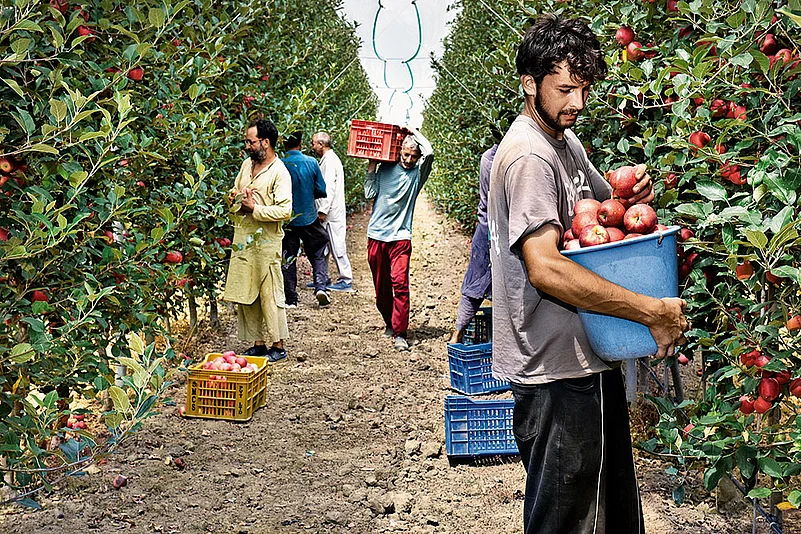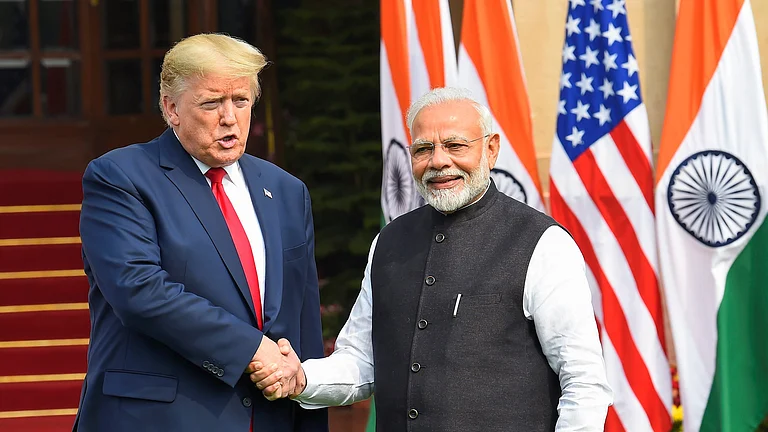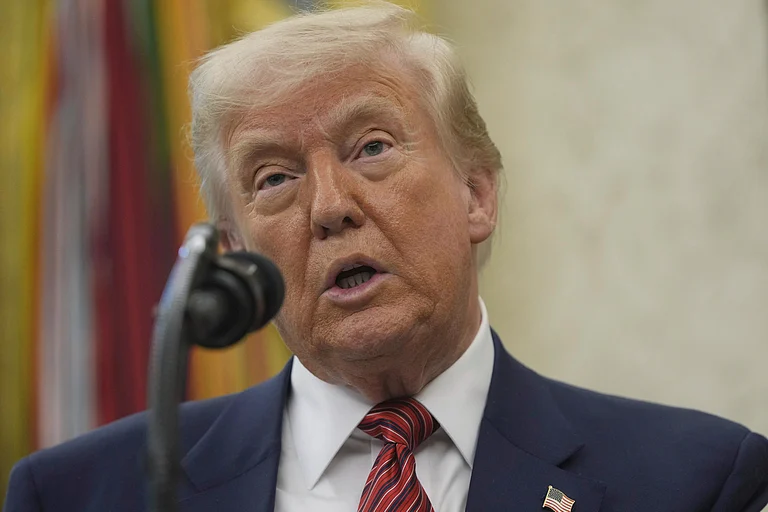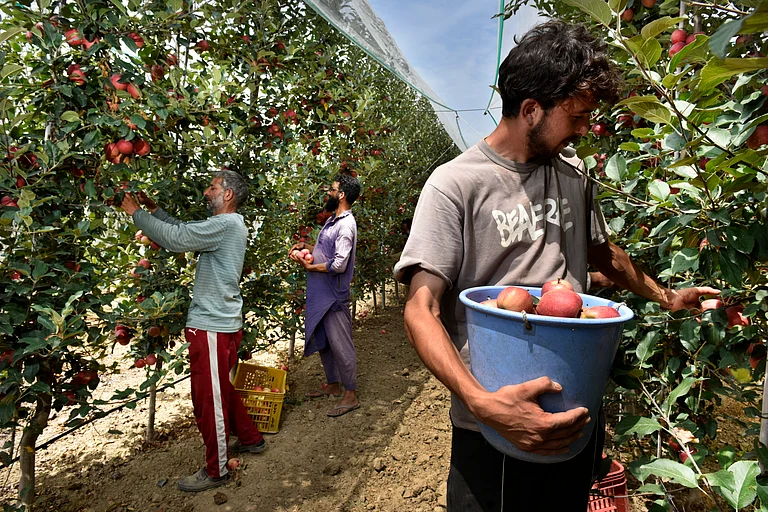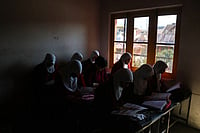
Cheap US imports of apples, walnuts, and almonds have pushed down prices in Kashmir, forcing farmers to switch to high-density apple varieties.
Trump’s 50 per cent tariff on Indian goods has stalled exports, leaving dry fruit traders without orders and stocks unsold.
Farmers and traders fear India may reduce duties on US imports, worsening the crisis for Kashmir’s horticulture sector.
In Muran, a village in South Kashmir’s Pulwama district, a group of labourers sat under a tarpaulin tent for a quick lunch before resuming work in the apple orchards. Around them, plastic crates piled high with freshly plucked fruit waited to be weighed and carted off. The grove, reached through narrow dirt tracks and sloping fields dotted with grazing cattle and scattered houses, has in recent years shifted to high-density apple varieties imported from Italy. The switch came as farmers struggled to cope with falling prices, a slide fuelled by the steady inflow of cheaper, imported Washington apples into Indian markets.
In Kashmir, the impact of apple imports from the United States, along with California walnuts and almonds, was being felt long before President Donald Trump imposed a 50 per cent tariff on Indian exports. The Valley contributes close to 98 per cent of India’s walnut output, with an annual production of 3.5 lakh quintals, and more than seven lakh families rely on apple orchards for their livelihood. Heavy imports from the US had already weakened the sector, and the fresh tariffs have now left exports nearly dried up.
The produce from Kashmir has in recent years been fetching lower prices and farmers have demanded that the Central government increase tariffs on the import of horticultural produce from the US to save the local industry from recurring losses. Abdul Rashid Mir, 65, who spoke as he ate, recalled that after damage to his orchard during the snowfall in 2019 and owing to the lower prices of the traditional crop, he converted his 11 kanals (one-eighth of an acre) of land into a high-density farm in Muran. “If the imports stop, then certainly our prices would go up. Right now growing the high-density apple crop is very costly,” said Mir, pointing towards the black plastic pipes spraying water into the field and the mesh of netting to protect the produce from hailstorms, both additionally required for these orchards to yield better produce.
“Growing traditional apples takes less money and effort than the high-density crop, which has to be watered regularly and pruned carefully. But all this is important, as the prices of other varieties of apples, like the Delicious variety, are lower due to imports of apples from the US,” he said.
“There are fears that under US pressure, India would be forced to reduce the import duties, which would be a major setback.”
A few miles away from the orchard in Muran, inside their cosy home built on farmland of over 65 kanals where a row of kiwi plants stood out from a large apple orchard, Afshan Rashid, who manages the field in the Pulwama area along with her husband, said that the imports and the middlemen have affected both the apple crop and the walnut and almond rates. “The rates of almonds and walnuts have taken a major hit and people told us that in a city like Mumbai, residents largely buy Washington apples,” she said. The family, originally from Central Kashmir’s Ganderbal area, bought the land several years back in Pulwama to also grow a relatively better-priced, high-density apple crop on it.
Furqan Akbar, 26, whose godown had remained stocked with dry fruits, particularly Kashmiri almonds and walnuts, said that it had stood empty for the past month after the announcement of tariff hikes by Trump. Furqan, who completed his bachelor’s degree in computer applications (BCA) from Pulwama in 2021, started the dry fruit export business with the United States (US) as his major market. Now with the fresh tariffs, orders from the US have not been coming through, virtually bringing the venture, with an annual revenue of $1 lakh from the American market, to the verge of closure.
Furqan has not lifted stocks from the growers since Trump’s fresh tariff orders. “Apart from the dry fruits, I used to export saffron from here to several markets, but our main buyers were from the US and after the tariff order, the orders have been hit,” said Furqan. He added that after fresh levies pushed up the per kg cost of walnut and almond kernels from the earlier price range of Rs 1,200 to 1,800, customers in the US have not ordered fresh stocks.
However, on account of the imports that have pushed down apple prices across India, farmers in Kashmir have not only switched to high-density varieties of apple, which give fruit within two to three years, but have also turned to mechanised packaging to lower production costs. At a grading facility in the Tiken area of Pulwama, apples rolled over large steel machines, getting washed and dried on the packaging line and sorted into different sizes. Ghulam Nabi Mir, who set up the grading facility, said US imports cut prices by 20 per cent. His mechanised unit charges Rs 100 per pack, cheaper than manual packaging. “We are not importing anything which cannot be produced here. If Kashmiri apples are better in quality than the US apples, why are we importing them?” asked Ghulam Nabi, as he shifted his eyes to a truck parked in the compound being loaded with fruit taken out from his grading facility.
Showkat Ahmad Hajam, 38, an apple trader, examined his fruit at the Tiken grading line. He said imports, especially from the US, were lowering Kashmir’s orchard produce prices and urged higher taxes on US imports, saying traders struggle with only six per cent commission, or 12 per cent with advance loans. “There are several challenges that the horticulture industry in Kashmir is facing. Apart from huge amounts of unpaid bills by traders outside Kashmir, the heavy imports remain our major concern,” Showkat said.
The tariff hike by the US has also resulted in an overall drop in apple prices this year, bringing them down significantly as traders fear that India may be forced to reduce import duties on horticultural produce from the country to get reciprocal concessions in export trade.
Nazir Ahmad Sher, upset at smaller apples in the Pulwama market, said each box fetched between Rs 500 and 600, half of last year’s price. “There are fears that under US pressure, India would be forced to reduce the import duties, which would be a major setback for the horticulture business in Kashmir. That will be like doom,” said Nazir, attributing the drop in prices to market uncertainty.
Traders fear that as the apple harvesting season progresses and more varieties ripen for picking, the impact could deepen. Shabir Ahmad Wani, 48, a trader from the Mitrigam area of South Kashmir, said, “Right now only the high-density varieties of apple are being harvested and as more varieties are picked, the impact of the price drop could be more harsh,” he said, as other traders sorted packs of apples and finalised relatively cheaper deals with growers at their counters inside the Pulwama fruit market. Local traders who watched a few pick-up trucks being loaded with apple cartons said that their commissions would also be lower this year in view of the price drop.
Besides apples, increased fares have also hit supply orders of walnuts and almonds, with the dry fruit industry already struggling due to undervalued horticulture imports from the US.
Bahadur Khan, a dry fruit trader, said that dry fruit produce from the US was being undervalued and dumped into markets across India, which has hurt Kashmiri farmers. “There had been some action earlier in Mumbai when the walnut and almond imports from the US, which were undervalued, were seized. We have also approached the authorities to curb this, but there has been no action,” he said.
Growers who also protested in parts of South Kashmir have demanded that the authorities increase tariffs. The Kashmir Valley Fruit Growers and Dealers Union recently wrote to Prime Minister Narendra Modi seeking an increase in import duty on Washington apples to 100 per cent. “Our industry has been badly hit by the imports of Washington apples. The apples that come to India are grown using pesticides, but our product is organic. We have sought the increase in import duties so that the local economy is not hit,” said Bashir Ahmad Bashir, president of the Kashmir Valley Fruit Growers Association.
Zia-ul-Islam Mir, a dry fruit trader in north Kashmir’s Kupwara, said that the walnut trade has faced a heavy impact due to US imports. “There is not much difference in the rates of Kashmiri varieties of walnuts and those from the US. Each kilogram of California walnuts costs Rs 400-500 against Rs 300-350 for Kashmiri walnuts. The market for the local produce has taken a massive hit due to heavy imports,” said Mir.
MORE FROM THIS ISSUE
Ishfaq Naseem is senior special correspondent, Outlook. He is based in Srinagar






